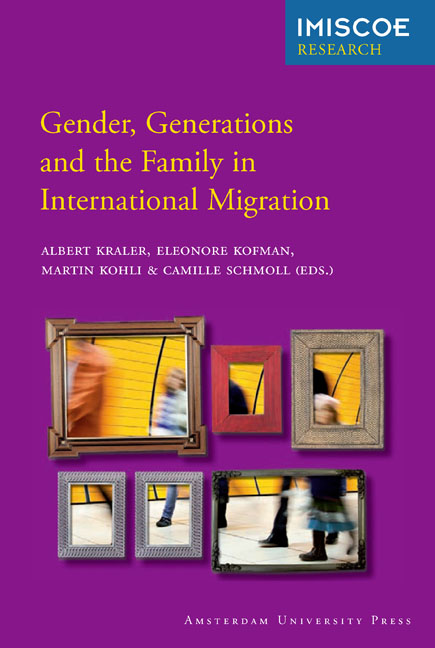Book contents
- Frontmatter
- Contents
- Preface
- 1 Introduction: Issues and Debates on Family-Related Migration and the Migrant Family: A European Perspective
- Section I The Family as a Moral and Social Order
- Section II Gender, Generation and Work in the Migrant Family
- Section III Marriage Migration and Gender Relations
- Section IV Transnational Family Lives and Practices
- List of Contributors
- Index
- Other IMISCOE titles
Preface
Published online by Cambridge University Press: 21 January 2021
- Frontmatter
- Contents
- Preface
- 1 Introduction: Issues and Debates on Family-Related Migration and the Migrant Family: A European Perspective
- Section I The Family as a Moral and Social Order
- Section II Gender, Generation and Work in the Migrant Family
- Section III Marriage Migration and Gender Relations
- Section IV Transnational Family Lives and Practices
- List of Contributors
- Index
- Other IMISCOE titles
Summary
Over the past decade, family migration has moved to the centre of political debates on migration, integration and multiculturalism in Europe. This has occurred both in national contexts and at the European Union level. In a similar vein, academic interest in various family dimensions of international migration has grown considerably, forming them into a core concern of migration research at large. Not only is there a flourishing of specialised research projects, publications and conferences addressing family-related aspects of international migration, but such issues are also increasingly discussed in the context of other work not especially concerned with family migration.
This said, the observation a co-editor of this book made in a review of research on family migration more than seven years ago, that there has been little analysis of many of the relevant issues in the European context partly, still remains true today (Kofman 2004: 244). While no longer seen as a neglected field within migration studies in Europe, the different strands of research – including legal and policy analysis of family migration policies, anthropological research on family practices and identities in a transnational context and sociological analysis of macro-patterns of family forms and patterns – frequently stay quite separate from, and largely ignorant of, each other. In addition, and despite the quantitative relevance of families affected by international migration, the migration dimension of family forms, patterns and practices is still marginal in the field of mainstream family studies. Compartmentalisation of more general research on families and research on migrant families, specifically, is also reflected in official governmental reporting and monitoring practices. Frequently, separate reporting systems are in place when it comes to migrants. Furthermore, migration issues are often marginalised, if not altogether ignored, in general reports and monitoring on the situation of families.
Taking stock of what we know about the family dimensions of international migration and its patterns was one of our main objectives for this book. However, so was uniting different strands of research on the migrant family to allow them to speak to each other, or as one well-known edited volume on migration theory put it, ‘talking across disciplines’ (Brettell & Hollifield 2000).
- Type
- Chapter
- Information
- Publisher: Amsterdam University PressPrint publication year: 2012



